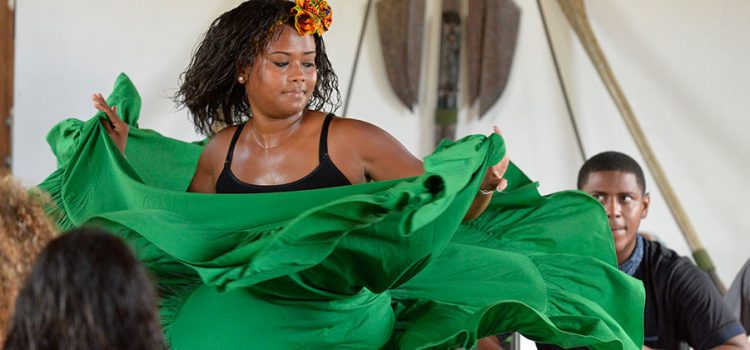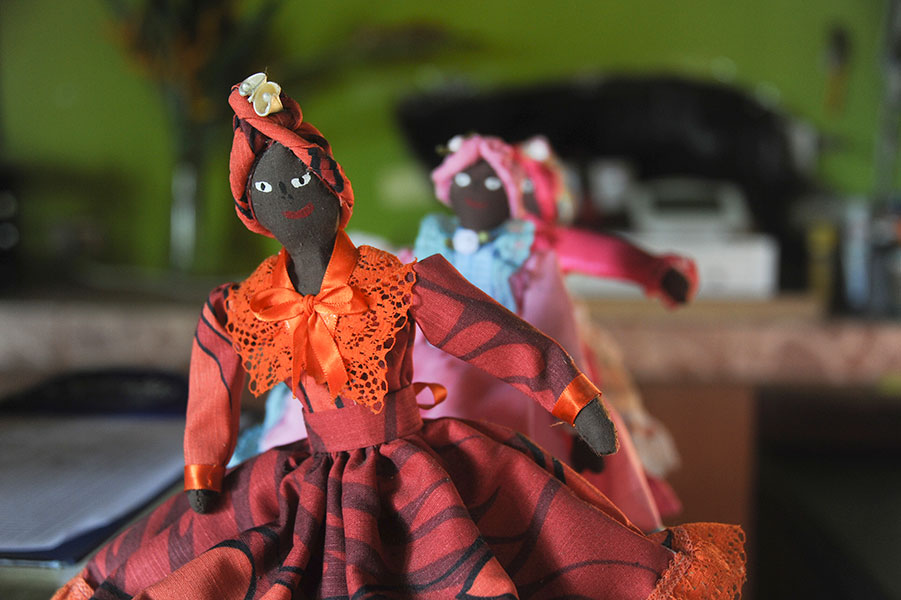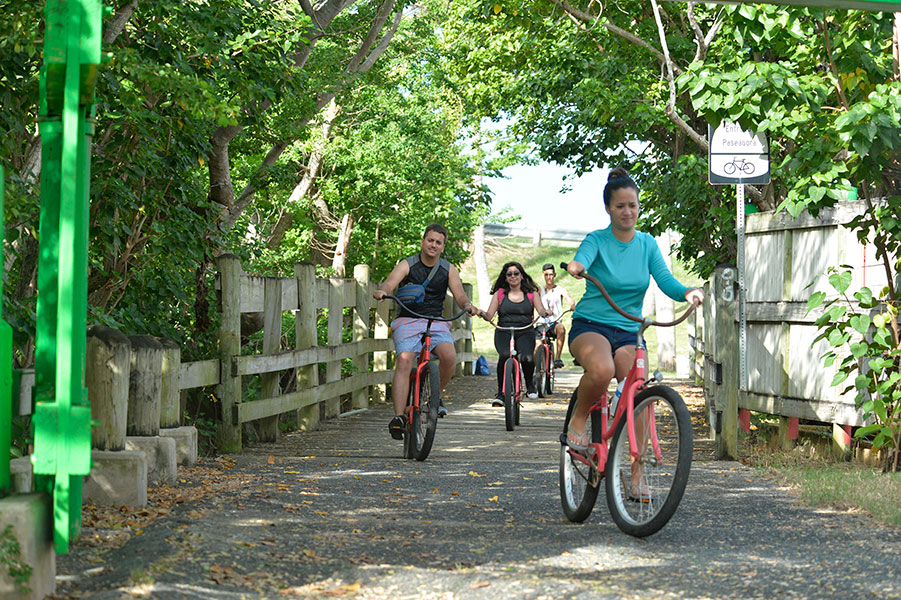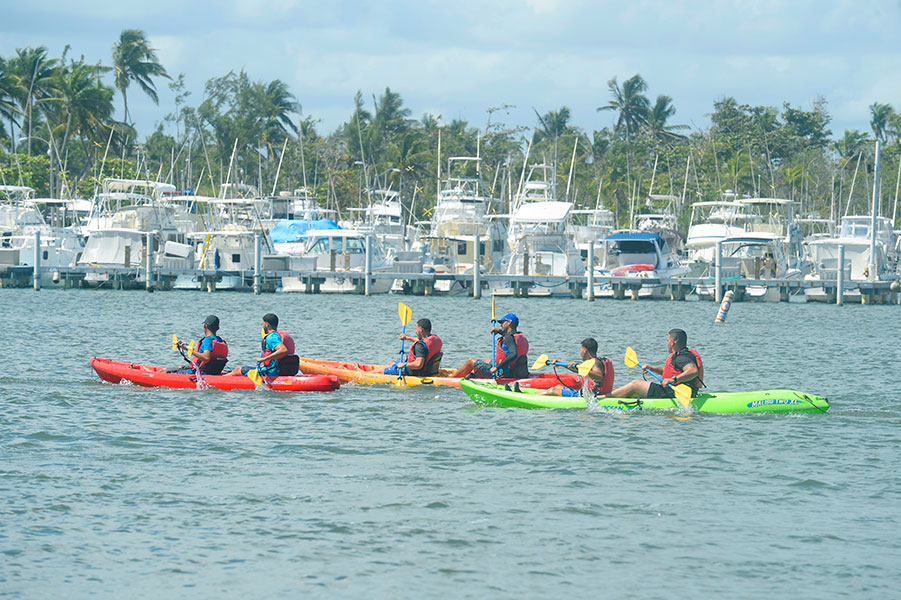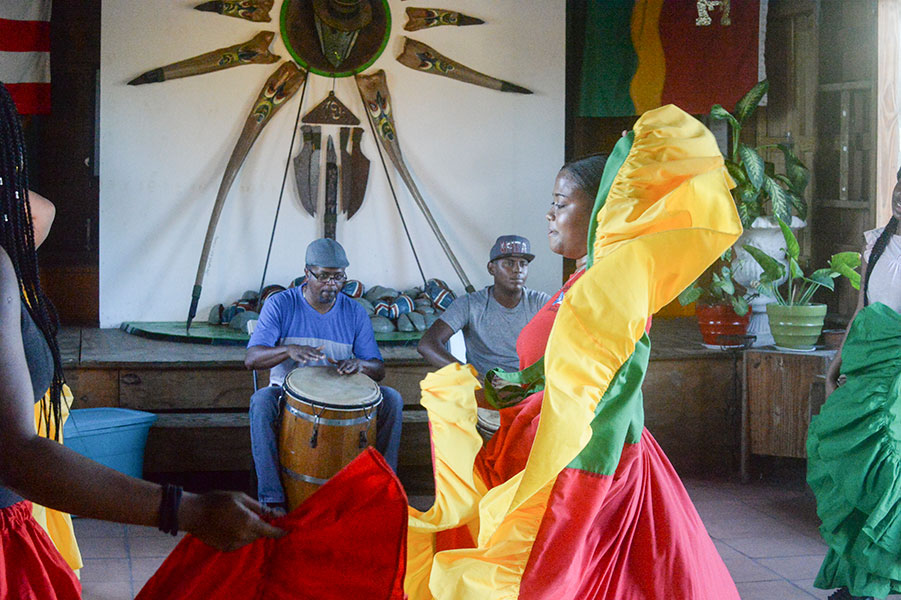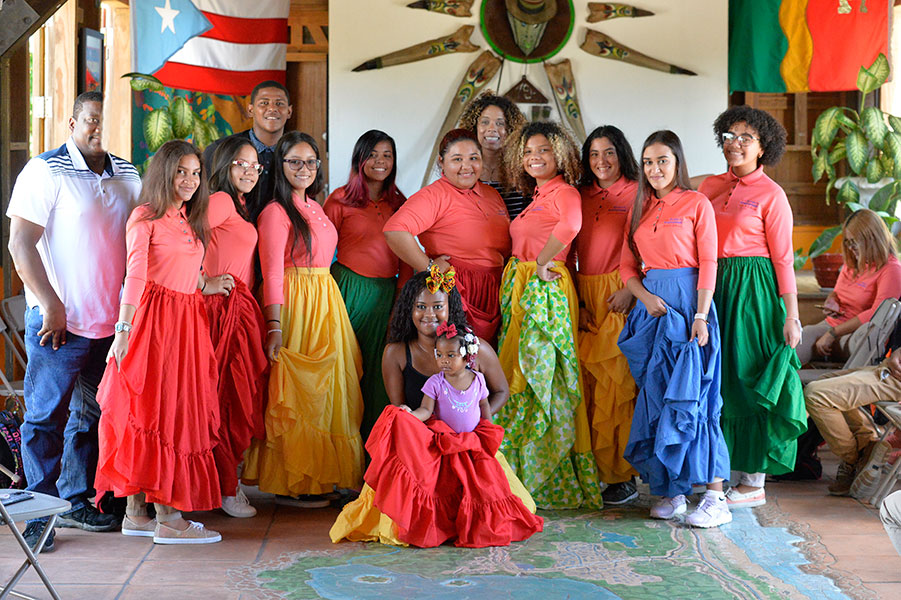A hands-on exploration of Puerto Rico’s powerful expression of African heritage
A short drive from San Juan’s international airport, the vibrant oceanfront community of Piñones is a feast for the senses.
A constant sea breeze is infused with the scrumptious scent of criollo food and carries a Caribbean-infused soundtrack from dueling stereo systems mixed with crashing surf.
At the intersection where the breathtaking blues of the Atlantic Ocean meet the emerald maze of the island’s largest mangrove forest, Piñones offers a wide range of sun and sand activities from bike rides along the beach to fishing for tarpon in the lush Torrecillas Lagoon.
Soaking up the rays, barefoot and cold beverage in hand is surely a great way to pass the day – or several. But many modern travelers are looking past postcard perfect panoramas to unwind the threads of Puerto Rico’s rich cultural fabric.
Piñones provides a unique opportunity to dig deeper into Puerto Rico’s powerful expression of African heritage -bomba, the drum-driven musical genre for dance that stands as perhaps the island’s oldest indigenous musical tradition still being practiced today.
Bomba can be characterized as the beating heart of an Afro-Caribbean culture –derived from West Africa, through the importation of slaves to Puerto Rico from that region, which has survived myriad challenges and continues to thrive in the shadow of San Juan and beyond. Playing an important role in preserving that legacy is the Corporacion Piñones Se Integra, or COPI, a community-based nonprofit organization that uses the Cultural and Ecotouristic Center of Piñones that sits at the eastern entrance to Piñones at the confluence of the Boca de Cangrejos Bay and the Torrecillas Lagoon.
Founded nearly two decades ago by sociologist and social worker Maricruz Rivera Clemente, COPI works to improve conditions for Piñones residents, businesses and visitors through a range of initiatives including community empowerment and microenterprise development.
Front and center in the effort is bomba.
“Bomba is the base of everything,” Rivera Clemente tells Bienvenidos, noting that COPI’s bomba workshops and classes, Afro-Puerto Rican music shows [bomba y plena] are open to the public and vital to the mission to preserve and raise awareness about this cultural cornerstone.
In the process, COPI provides an unmatched opportunity for visitors and corporate groups to grab a hold of Puerto Rico’s cultural roots through active participation in bomba classes (the second and last Friday of the month), putting their hands to work pounding away on barrel drums or putting the rest of their bodies through the paces on the dance floor replete with traditional twirling skirts.
Typically, a bomba starts with a female solo voice who sings a phrase evoking a primitive call. The chorus makes an antiphonal response supported by the musicians who provide the 2/4 or 6/8 rhythm with various percussion instruments. Meanwhile, the dancers proceed with their movements, in pairs and without contact, taking turns challenging the drums.
While COPI runs regular scheduled bomba workshops and shows, corporate groups can always reach out to set up group classes. COPI also hosts performances by its Majestad Negra folkloric ballet troupe.
Bomba team building classes are fun and, more importantly, can be tailored to improve performance and enhance workplace culture.
“Everyone is welcome and everyone can take part,” Rivera Clemente says. “We want to share this with the world.”
A melting pot of Spanish, African and Taino traditions permeates Puerto Rico, with those three pillars forming a unique identity of which islanders and members of the far-flung diaspora remain fiercely and justly proud. The island’s cuisine, vocabulary, architecture and arts are all informed by this heady mix.
While bomba has been sometimes billed as a blend of the three pillars of Puerto Rican culture, it is more accurately celebrated as a living reflection of the island’s African heritage, a vital plank in the cultural base that cannot be overlooked or verstated.
Bomba was built from hardship, pain and deprivation. It sprang from the musical traditions carried by Africans in bondage on 17th century slave ships to Puerto Rico, branching out over time to include well over a dozen distinct rhythms with discrete dance steps for each.
Bomba took shape on Puerto Rico’s sprawling sugar plantations as a multi-faceted form of expression, of communication and, at times, rebellion, and it was carried deep into dense havens for escaped slaves such as Piñones.
As the Smithsonian Museum’s Folkways Magazine states, “To them, bomba music was a source of political and spiritual expression. The lyrics conveyed a sense of anger and sadness about their condition, and songs served as a catalyst for rebellions and uprisings. But bomba also moved them to dance and celebrate, helping them create community and identity.”
But bomba is not an art form relegated to the museum shelves. It is alive and well and surging along new avenues as artists push its percussive pulse across genres, opening new horizons in the process. Purists need not fret, traditional bomba is also in practice, thanks in part to efforts to preserve and share this iportant part of Puerto Rico’s cultural legacy by COPI.
COPI’s classes concentrate on the seven classic rhythms that define bomba in Piñones and in the broader municipality of Loiza of which it is part. Participants will enjoy hands-on instruction in bomba drum rhythms and dance steps.
“We want people to know they shouldn’t feel scared. The idea is to play and dance as if nobody is watching,” Rivera
Clemente says. As a donor-driven nonprofit, COPI relies on donations as an important revenue source to continue its mission, so participants should be prepared to give back a bit for the gift of bomba.
Plan to make at least a day of your visit to Piñones as COPI also rents kayaks and bicycles through the
AcuaNatura and CicloNatura micro-enterprises, respectively. For more information you can enter www.copipr.com.
And make sure to bring your appetite for Puerto Rican fare and thirst for new adventures.

